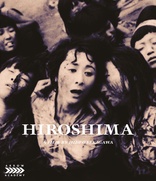Hiroshima Blu-ray Movie
HomeHiroshima Blu-ray Movie 
ひろしま / Arrow AcademyArrow | 1953 | 104 min | Not rated | Jul 14, 2020
Movie rating
7.5 | / 10 |
Blu-ray rating
| Users | 0.0 | |
| Reviewer | 3.5 | |
| Overall | 3.5 |
Overview
Hiroshima (1953)
The film shows the bombing of Hiroshima and the horrific aftermath following the detonation of an atomic bomb on humans for the first time in history.
Starring: Eiji Okada, Yumeji Tsukioka, Yoshi Katô, Takashi Kanda, Isuzu YamadaDirector: Hideo Sekigawa
| Foreign | Uncertain |
| Drama | Uncertain |
| War | Uncertain |
| History | Uncertain |
Specifications
Video
Video codec: MPEG-4 AVC
Video resolution: 1080p
Aspect ratio: 1.37:1
Original aspect ratio: 1.37:1
Audio
Japanese: LPCM 2.0 Mono
Subtitles
English
Discs
Blu-ray Disc
Single disc (1 BD)
Playback
Region free
Review
Rating summary
| Movie | 3.5 | |
| Video | 3.5 | |
| Audio | 3.5 | |
| Extras | 3.5 | |
| Overall | 3.5 |
Hiroshima Blu-ray Movie Review
Reviewed by Jeffrey Kauffman August 6, 2020There are certain moments in various films that have become so iconic that they've almost become ingrained in a kind of collective unconscious appreciation of them, so that virtually anyone and everyone instantly recognizes them. A baby carriage careening out of control down some steps in Battleship Potemkin, a snowglobe tumbling to the ground along with a whispered "Rosebud" in Citizen Kane, the famous "match edit" in Lawrence of Arabia, or a cropduster chasing a hapless (if suave) man through a field in North by Northwest — these are just a few of countless examples that virtually any film fan will remember and relate to. But there are other, probably more personal, moments that every individual who has a love affair with the movies may have seared upon their unique memory. In that regard, a sequence which really disturbed me when I first saw it in my late teens and which has continued to be upsetting every time I've revisited the film, is a devastating series of images that unfold in Alain Resnais’ Hiroshima mon amour which document the horrifying injuries suffered by those who managed to survive the initial atomic blast that hit the Japanese city on August 6, 1945.
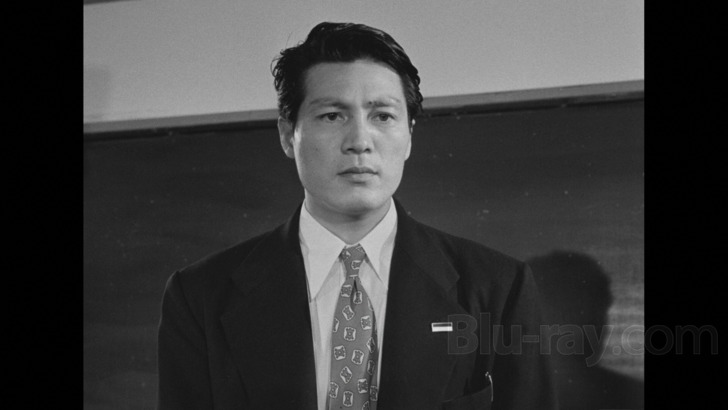
That particular footage is, from what I've been able to glean in doing a bit of background research, from actual newsreels and other contemporary film shot in the wake of the blast, but there are other scenes in Hiroshima, Mon Amour which use footage from this 1953 film, which ironically also stars Eiji Okada. The 1953 Hiroshima has none of the "metaphysical" musings of the Resnais film, and it is a much more overt, actually screed like at times, offering that features some really interesting content, but which may still strike modern day viewers as occasionally a bit too melodramatic for its perceived aims. Jasper Sharp, who contributes another superb supplement to an Arrow Blu-ray release in the form of a video essay, actually disputes the widely held belief that the 1953 Hiroshima was produced at the behest of the Japan Teachers Union, a group that was evidently unhappy with the 1952 film adaptation of Children of Hiroshima, and wanted something more visceral to make the perhaps over obvious point that war is bad, and atomic war is especially grievous.
The result is a film that offers some undeniably arresting imagery as it recreates the devastation wrought by the atom bomb, but which also tries to develop more character driven drama courtesy of another storyline (which is actually introduced first) dealing with survivors in 1953. In this time frame Okada portrays a teacher named Kitagawa who is forced in a way to come to terms with the fact that many of the people he knows, notably some of his own students, are suffering from radiation sickness and are probably mortally ill. In fact an early scene documents the quick decline of a schoolgirl, and includes one of the film's most provocative elements, when another student reads her a bit of propaganda from Germany which takes the United States to task for complaining about Germany's use of chemical weapons in World War II when it then turned around and used Japan as a "guinea pig" for its test of a "new, improved" bomb. There are other distinctly anti-American aspects that are at least alluded to here, in content that Sharp avers wouldn't have been possible during the American "occupation" of Japan, which was at the time of the film's production coming to a close.
The sequences documenting the blast and its aftermath are obviously the most intense of the film, and I can't imagine that they weren't cathartic in some way for the Japanese people who appeared in the film or were involved in the production, but that said, I'm really not sure how modern eyes will perceive scenes that are kind of blatantly theatrical at times, however deep their emotional intent. There are some standout moments in this time frame, though, with some of the scenes involving schoolchildren especially memorable. The recreation of the devastation has a few kind of quaint special effects, but is overall quite effective.
If you're like I am, you may have spent the past couple of days absolutely gobsmacked by the footage coming out of Beirut after the epochal explosion at its port there. Several news reports I've read have compared this to Hiroshima, albeit in a fractional way as being around 1/5 the size of the Hiroshima blast. The fact that imagery as unbelievable as what many have witnessed in the past couple of days is only around twenty percent of the size of the Hiroshima event may help to give some context to what the Japanese people went through. That part of Hiroshima is often unavoidably effective, but I'm not certain how well some of its more overt political statements may resonate for some.
Hiroshima Blu-ray Movie, Video Quality 
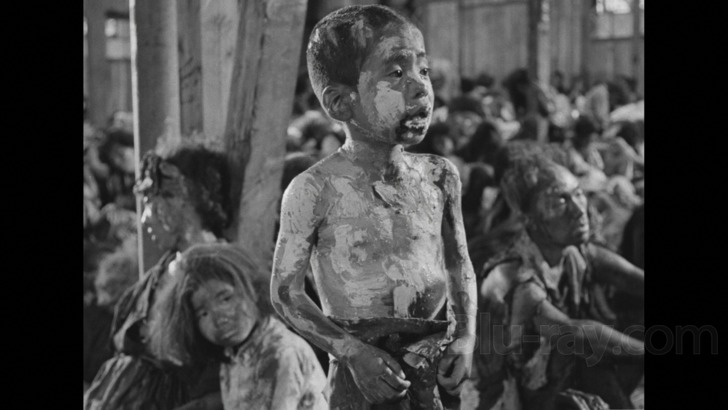
Hiroshima is presented on Blu-ray courtesy of Arrow Academy, an imprint of Arrow Video, with an AVC encoded 1080p transfer in 1.37:1. Arrow's insert booklet contains only the following fairly generic verbiage about the transfer:
Hiroshima is presented in its original 1.37:1 aspect ratio with mono audio. The High Definition master was provided by Raintrail Pictures.The back cover does also disclose that "this new High Definition presentation is the complete version, restoring the footage from the international edit that was released in the United States in 1955", a restoration which may account in part for the pretty heterogeneous appearance on display here. The element (or elements) utilized show pretty significant damage a lot of the time, to the point that some may feel my score of 3.5 is overly generous. There are numerous incidents of rather large and long lasting scratches, nicks, very rough looking optical dissolves as a rule rather than an exception, and even some jittery frames. There's also what looks like stock footage at times, which can be in seriously bad shape (especially when combined with optical dissolves), and there's also one very short snippet that is in pretty ragged shape that looks to me like it was culled from that same disturbing documentary imagery I found troubling in the Resnais film, in this case a scene of a little boy with a pretty nasty leg wound. But considering the fact that the film was evidently not curated very well, the sections here that look good, which admittedly can be "interstitial" in between more problematic moments, can look very good indeed, with nicely deep blacks, well modulated gray scale, and typically very precise looking fine detail. Even in some of the more badly damaged moments, grain resolves well and there are no compression anomalies even considering long scenes that have a lot of dust and debris from the explosion and its aftermath in the frame.
Hiroshima Blu-ray Movie, Audio Quality 
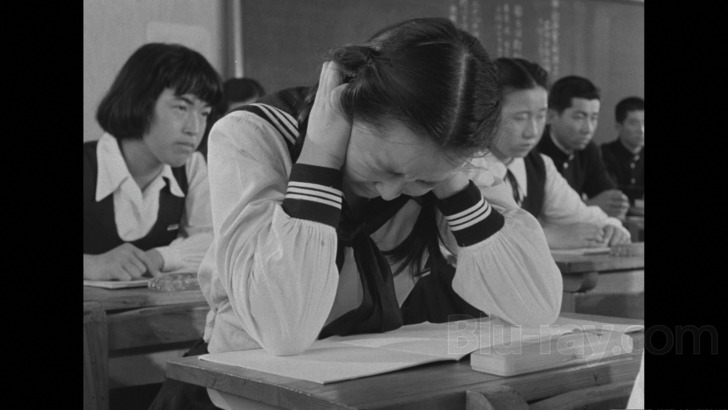
Hiroshima features an LPCM 2.0 Mono track in the original Japanese, with optional English subtitles. While obviously a product of its era, and occasionally subject to some momentary damage that is typically accompanied by similar problems simultaneously in the video department, this track delivers the film's dialogue without any major issues. Sound effects, as in the calamitous detonation, as well as the repeated use of music as both underscore and within the story itself, all sound fine, given the context of the track's era.
Hiroshima Blu-ray Movie, Special Features and Extras 
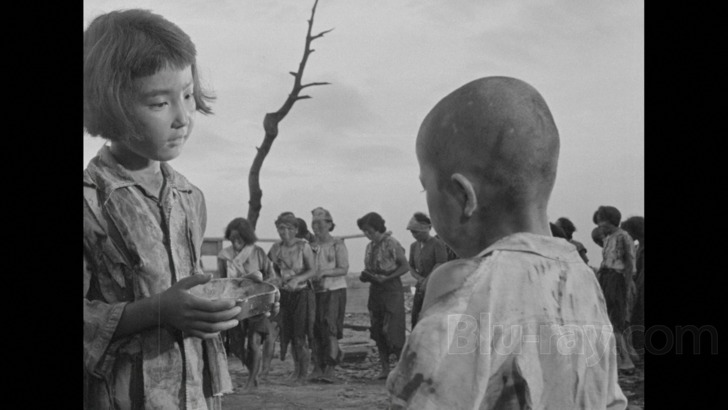
- Hiroshima Nagasaki Download (1080i; 1:12:53) is an absolutely riveting if intentionally kind of "Arty" documentary by Shinpei Takeda which features a bunch of interviews with actual survivors of Hiroshima and Nagasaki now living in Canada, the United States and Mexico. This comes with a separately accessible Introduction (1080i; 2:36) by director Shinpei Takeda.
- Hiroshima, Cinema and Japan's Nuclear Imagination (1080p; 33:21) is a far ranging video essay by Jasper Sharp which examines some of the cinematic treatments of the bombings.
- Interview with actress Yumeji Tsukioka (480i; 6:00) is an archival piece with one of the film's stars. In Japanese with English subtitles.
Hiroshima Blu-ray Movie, Overall Score and Recommendation 
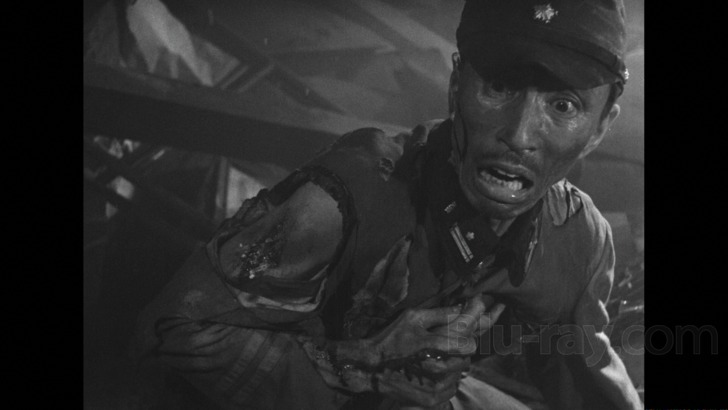
It's just one of those inexplicable coincidences that this film should have appeared in my queue the day before the 75th anniversary of the dropping of the atomic bomb on Hiroshima, meaning that the writing of this review served as a remembrance of sorts for me on the actual day the bombing took place. One of the kind of interesting pieces of military memorabilia I inherited from my World War II veteran father was a set of preliminary plans for a "Normandy" like invasion of Japan from the sea, and I've long wondered what might have happened had that strategy been pursued rather than the devastation wrought by the bombs dropped on Hiroshima and then Nagasaki. Hiroshima is a fascinating historical document that should certainly be of interest for those who want to see a uniquely Japanese response to the bombing, especially within the context of 1953 shortly after the official American occupation had ended, and Japanese filmmakers perhaps felt more free to express some long repressed emotions. Technical merits have a few challenges here, but the historical importance of the film as well as some really well done supplements help to make up for that. Recommended.
Similar titles
Similar titles you might also like

City of Life and Death
南京!南京! / Nanjing! Nanjing!
2009

The Bridge
Die Brücke
1959

My Way
마이웨이 / Mai Wei
2011

Fires on the Plain 4K
野火 / Nobi
1959

Ivan's Childhood
Ива́ново де́тство / Ivanovo detstvo
1962

Land of Mine
Under Sandet
2015

The Captain
Der Hauptmann
2017

Black Rain
Kuroi ame
1989

Stalingrad
1993

Alexander Nevsky
Александр Невский / Aleksandr Nevskiy
1938

Sophie Scholl: The Final Days
Sophie Scholl: Die letzten Tage | 4K Restoration
2005

Generation War
Unsere Mütter, unsere Väter
2013

The Cranes Are Flying
Летят журавли / Letyat zhuravli
1957

A Hidden Life
2019

Operation Red Sea
红海行动 / Hong hai xing dong
2018

Ballad of a Soldier
Баллада о солдате / Ballada o soldate
1959

Downfall
Der Untergang | Collector's Edition
2004

The Painted Bird
Nabarvené ptáce / Slipcover in Original Pressing
2019

The Front Line
고지전 / Go-ji-jeon
2011

Das Boot
The Director's Cut | Single-Disc Edition
1981
